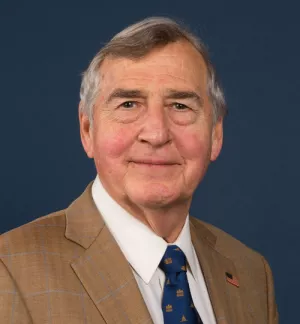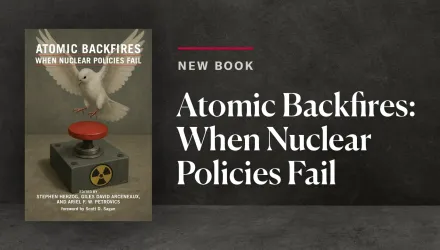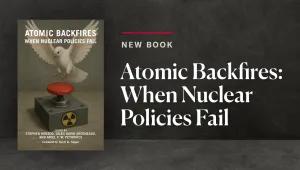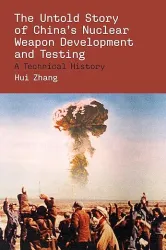Subject: Making Preventing Nuclear Terrorism a Central Organizing Principle of your Administration
This memo was originally written for the Aspen Strategy Group.
During the campaign, you asked people to think about just one nuclear bomb devastating the heart of just one great city. To combat this threat, you identified a dual challenge: (1) in the short run, a determined adversary who demonstrated on 9/11 a capacity to murder thousands of innocent Americans and (2) over the longer run, trendlines that threaten to take us to a world of nuclear anarchy. You named this threat the only clear and present "game-changer" for America as a free country with our fundamental institutions and values. You pledged that you would make preventing this catastrophe an organizing principle of your administration. This memo provides a brief outline of strategy and organization to fulfill that promise.
Historians will long debate whether your predecessor's primary distinction was: (1) strategic incoherence or (2) operational incompetence. No level of operational competence could have rescued President Bush's misguided strategic decision to confront and then ignore North Korea. This "no carrots and sticks" strategy left Kim Jong-il free to do precisely what he did: produce plutonium for eight additional bombs and conduct a nuclear weapons test. Ditto Iran, which is fortunately a slower train, but headed for the same destination.
Success in preventing nuclear terrorism and proliferation must start with a sound Presidentially-defined strategy. That strategy must include achievable objectives; calculated means to those ends; successive layers of supporting strategies and tactics; recalculation and adjustment in response to changing conditions; and relentless implementation. Key elements include:
- Reconstructing a global nuclear order according to a Doctrine of Four No's: No loose nukes; No new nascent nukes; No new nuclear weapons states; No role for nuclear weapons in international affairs.
- Raising the consciousness and stakes for leaders of key countries in helping shape this secure nuclear future -- especially Pakistan; Russia regarding its own materials but also Belarus; China vis-à-vis North Korea. A global undertaking to mobilize governments in a new 21st century nuclear equivalent of NATO: a Global Alliance Against Nuclear Terrorism with enforceable global gold standards for securing all weapons and materials; joint actions to interrupt, interdict, and eliminate trade in nuclear materials; and an agreed doctrine of accountability for a state's weapons and materials.
- Eliminating nuclear-capable global terrorists, focusing on Osama bin Laden, Zawahiri, and al Qaeda's nuclear command -- attacked by CIA-sponsored operations into the Federally Administered Tribal Areas (FATA) conducted by local warlords, essentially mirroring the strategy and tactics that toppled the Taliban in 2001.
- Cleaning out vulnerable nuclear materials from 20-plus states and hundreds of locations with research reactors and programs that still have bombs-equivalents of highly enriched uranium (HEU) and plutonium (Pu).
- Advancing an assured nuclear fuel initiative to prevent new national enrichment and reprocessing and bring current activities under international inspection and supervision.
- Significantly increasing counter-nuclear terrorist capabilities and activities through global intelligence, security, and law enforcement partnerships.
- Stopping Iran's acquisition of a nuclear bomb and rolling back North Korea.
Making this strategy an organizing principle of your administration will require:
1. Presidential priority demonstrated not just in words, but in deeds. The strategy must not only be presidentially-defined, but also presidentially-driven. Recall the "absolute priority" American Cold War presidents gave to preventing general nuclear war. It was, as JFK observed, an essential prerequisite for our pursuit of any other objective. Preventing nuclear terrorist attacks on the American homeland deserves analogous absolute priority. Communicating this through the administration will require demonstrating that you feel this priority in your bones: bringing it to bear in decisions across the spectrum of foreign policy challenges from Iran and North Korea to the Nonproliferation Treaty and homeland security.
2. Priority in national security and foreign policy. Among the most pressing issues on your foreign and national security policy agenda on Day One will be: Iran and the imperative of stopping it short of nuclear weapons; North Korea and persuading Kim Jong-il that he will be held accountable for his nuclear materials or bombs; China and the necessity for its leadership in eliminating North Korea's nuclear arsenals; Russia and the relative importance of Russian support for preventing Iran's nuclear bomb versus fast track membership for Ukraine in NATO, or missile defense in Eastern Europe; U.S. nuclear weapons and the need to "lead by example" if the widespread cynicism about the Nonproliferation Treaty is to be reversed and the regime revived.
Operationally, the nuclear terrorism policy of your administration will thus, perforce, largely be defined by choices at the high table about the first-order national security and foreign policy agenda.
3. Someone in charge: not "czar" but a "leader" who works directly for you on this priority 24/7; who knows these issues and is able to integrate strategic, technical, and political dimensions; whose influence flows from your confidence in them; who can convince people at many levels within the U.S. government, state and local governments, and foreign governments that this is their problem.
4. A menu of organizational options for putting someone in charge is analyzed in the CSIS-Belfer Center Report*: a czar (analogous to the drug czar); a lead agent or agency, either inside one of the Departments (the early Missile Defense Organization) or in the EOP; a senior White House official outside the NSC (like the Homeland Security Advisor Ridge in the first year)**; a senior White House official working within the National Security Council structure as a Deputy National Security Advisor. Each has strengths and weaknesses. I endorse the recommendation of that Report:
- Senior White House official as Deputy National Security Advisor whose authority flows from others' knowledge that she/he is your person charged to work 24/7 on the preventing nuclear terrorism agenda; who works only on this agenda; who gets up early every morning asking, what can we do today to prevent terrorists getting nukes? Responsibilities: refining, and driving your strategies; integrating policy, intelligence, and operations; leading programmatic cross-cutting reviews with Office of Management and Budget (OMB) of all counter-nuclear terrorism/proliferation activity; working with international counterparts in key states of the Global Alliance.
- Chairing a Deputies Committee of lead senior officials in each Department (Defense, State, Energy, Intelligence, and Homeland Security), each of whom works directly for the Secretary of that Department but for whom this is at least a one-third time assignment, to consider every issue that impacts this threat.
- An X-fold increase in the capacities of spies and shooters to eliminate global terrorists in your refocused campaign against global terrorists aimed at eliminating organized groups that have the intent and capability to conduct nuclear terrorist attacks on the U.S. and its allies.***
---------------------
*A Senior White House Official for WMD," 2004
**Legislated by H.R.I., 2007
***Note tradeoffs: Nuclear terrorism prevention narrow versus high level foreign policy choices that impact; nuclear versus nuclear and biological (i.e., all real WMD).
Allison, Graham. “Memo to President-elect McBama.” Aspen Strategy Group, August 22, 2008





